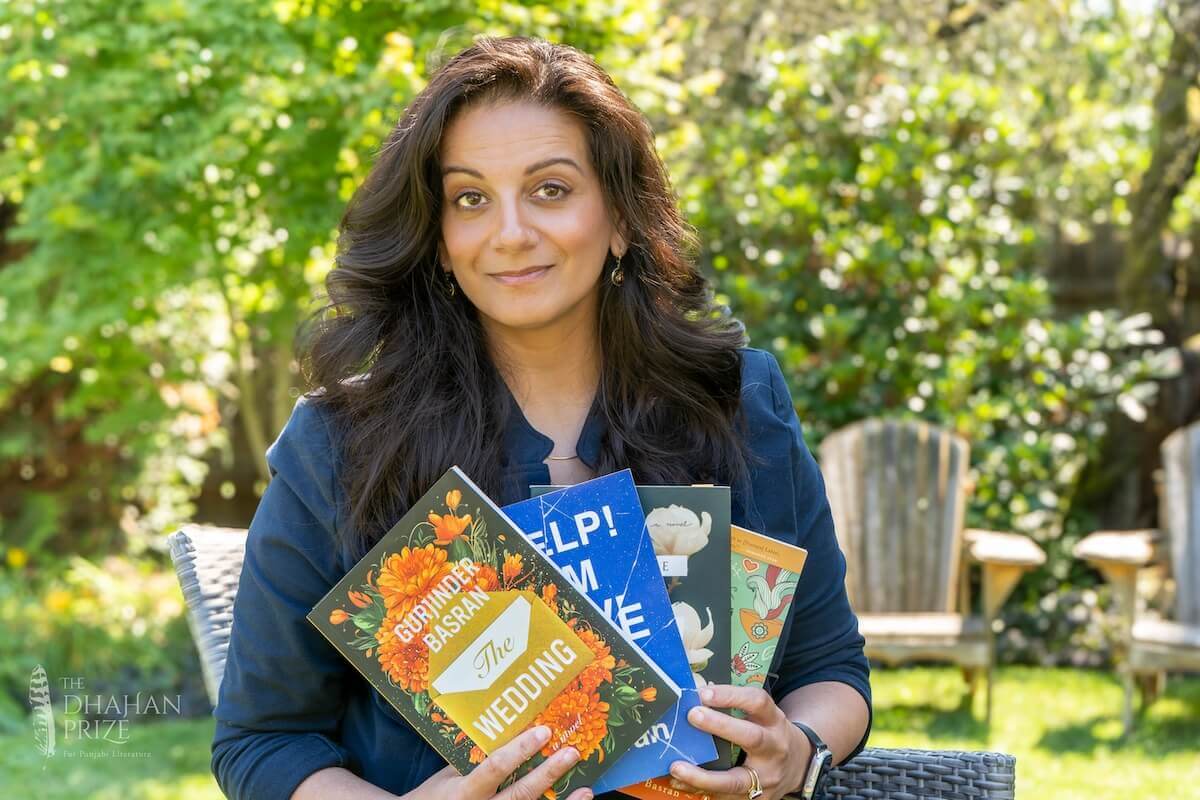
Gurjinder Basran is the 2025 Dhahan Prize keynote and an award-winning Canadian author. Her debut novel, ‘Everything Was Good-bye’ (Mother Tongue Publishing, 2010; Penguin, 2012) won the 2011 Ethel Wilson Fiction Award (by BC Book Prize). It was picked for the Chatelaine Magazine Book Club in 2012, among others.
She went on to write three additional titles, all of which have received accolades in an impressive list of media and author reviews. The compelling empathy in each story challenges clichés and stereotypes. She brings readers into the real and nuanced experiences of Punjabi immigrants and—importantly—their later generations.
Her narratives are set in the Vancouver, B.C. area, inspired by her home of Delta (a suburb of Vancouver). Her characters reflect her own identity as a Punjabi immigrant. They carry names like Pavan, Nanak, Simran and Balbir. Yet, they are just as human as the characters named Peter, Winona and Liam. Regardless of colour, all are portrayed as quintessential Canadians.
Her first book: “a very personal act of self exploration”
‘Everything Was Good-bye’ went through 20 drafts over five years, forming a journey that began when Gurjinder was just 34 years old.
The fictionalized novel stems from parallel truths in the author’s own life—a technique she uses often.
“I love fiction because it gives me latitude to play in a ‘what if’ space while still using real life as a springboard for my imagination,” she explains.
In it, a young Punjabi girl, Meena, falls for a boy named Liam—an event not welcomed by her widowed mother. The protagonist must make a choice that will imprint the rest of her life.
An underlying trope challenges the restraints of living in a culture bound by outdated expectations. Yet, that same culture holds the staying power of familial love, which breaks the heart to forfeit.
Originally taken up by an independent publisher (Mother Tongue), the book received so much support that it caught the attention of Penguin. The latter bought the manuscript rights and distributed it to a wider North American audience. The deal catapulted Gurjinder’s career as an Indian-Canadian novelist.
“Independent publishers are so important to the literary landscape because they are open to submissions and can take a chance on new writers, or experimental content that sometimes larger presses can’t take,” says Gurjinder.

Writing as “a vehicle for truth and revelation”, and that alone
Although each of her books have received acclaim, Gurjinder is indifferent to what large publishers or the masses want to hear. She uses her unconcern to explore meaning in a way that may feel unfamiliar to the ‘mainstream.’
“I classify my success in terms of the writing and whether I think I wrote something of value,” she says. “As a writer of colour, it’s easy to feel like a failure – in general you’re under-represented, your stories won’t necessarily have a mass appeal without a certain amount of pandering but that does not mean they are not worth telling.”
Growing up an assimilating Punjabi
Landing in Canada at the age of two in 1974, Gurjinder grew up the youngest of six girls. Her father died a year later. She was tended by her sisters while her mother worked for their survival. As younger immigrants often do, the siblings spoke English to each other, and a mix of Punjabi and English to their mother. This, of course, led to a loss of language.
“Though I lost my language, I did not lose my culture. Family was at the heart of everything we did,” she remarks.
Fluency in English didn’t stop the racism, pressure to assimilate and the derogatory label of being called “paki.”
“We faced the kind of racism that made you conform, and kept you scared,” recalls Gurjinder.
She notes that being Punjabi Canadian “ isn’t a homogeneous experience.” Yet, many see it that way.
“Every wave of immigrants experience their settling abroad differently. The first generations take the brunt of the racism, they assimilate to a degree, and they lose some of their culture and heritage in the process…
“In a way they pave the way so others do not have to assimilate as much and yet they are often looked down upon by subsequent waves of immigrants for having ‘lost’ their heritage,” she observes.
To demonstrate, her own children were once surprised to meet a distant relative who wore a turban while speaking fluent English with a British accent. On the flip side, many of their own peers have suggested they are ‘white washed’ for having adopted Western customs.
“It cuts both ways,” explains Gurjinder.
“I often wonder if you can ever stop becoming part of the diaspora experience. If a diaspora means residing somewhere other than your homeland and you have a few generations who were not born there and have not been there—are they still part of the diaspora or will diaspora and homeland become a metaphor for culture, identity and ancestry?”
Captivating audiences with ‘The Wedding’
Her latest launch, ‘The Wedding’ (Douglas & McIntyre, 2024), has received accolades from multiple media, including the CBC, The Vancouver Sun, Post Media, Desi News, The Walrus and more. The story resonates with anyone from a South Asian heritage who has gone through the production of a culturally-rooted wedding—either as hosts, or guests.
But even to non-South Asians, the ‘sizzle’ is all too real. Gurjinder grounds the spectacle of a Punjabi wedding in vivid, relatable reality. She gives readers the thoughts, feelings and vantage points of 15 characters, all while challenging the assumptions of what some may think an Indian person’s life is like.
From the bride and groom to “the bad boy,” “the family friend” and the white neighbour (“Mrs. Richardson”), the story brings out drama, tension and all the mixed feelings that come with an extravagant wedding. Meanwhile, the wedding itself is a character in its own right, as intended by Gurjinder while she wrote the story over two and a half years.
Using fiction as a pathway to understanding
Gurjinder’s, ‘The Wedding’ comes after two novels of a completely different theme: death and grieving.
In ‘Help! I’m Alive’ (ECW Press, 2022), Gurjinder uses her insight into the human psyche in a way that is, arguably, unknown to most. She writes a solemn story about the aftermath of a teen’s public suicide. The tale delves into the multi-faceted ways people of all ages heal from unimaginable, emotional pain.
In ‘Someone You Love is Gone’ (Penguin Canada, 2017; HarperCollins US, 2017), Gurjinder draws upon the experience of her own mother’s death. She explores a fictional woman’s inner reactions to strife and broken relationships. The book took her 7 years to complete; she had to take a break when her mother passed from cancer.
Her ‘secret’ to immersive storytelling (it’s not a knack for words)
While Gurjinder’s writing has captivated many, being a novelist was not a foreseen path for her.
“I don’t think I had a special talent for writing. I think I have a talent for seeing,” she explains.
“As the youngest of six children, I’ve always had a keen sense of observation and a curious nature, especially when it comes to people. I’ve always wondered why people act the way they do, or say what they say, and I’ve had the ability to see how sometimes seemingly disparate ideas or events are connected,” she continues.
To that end, she says her process starts with curiosity:
“Every time I start a new novel, it’s usually in response to a question I have about the world.
“Every book has its own ‘process’ but what they all have in common is they usually start with an image. Usually some image or scene pops into my mind that I cannot forget,” she explains.
Her other ‘trick’ is music:
“Every novel generates a playlist and when I listen to it, it’s like a shortcut to the imaginary world of the novel and helps me get into a creative flow faster.”
Developing her talent, and passing the skill to others
Gurjinder possesses a Certificate in Creative Writing from Simon Fraser University, which she believes was essential to her success.
But, to become a published author, she says perseverance is needed.
“I had to learn to be a beginner, learn to accept feedback, learn to apply feedback and accept rejection and redirection. Over time I had to also develop enough confidence to be clear about my own voice, and style and in doing so decipher what types of stories I wanted to tell.”
To help develop the next wave of authors, Gurjinder mentors writers through the Vancouver Manuscript Intensive. She also works as Director of Channel Execution at Bell Canada.
